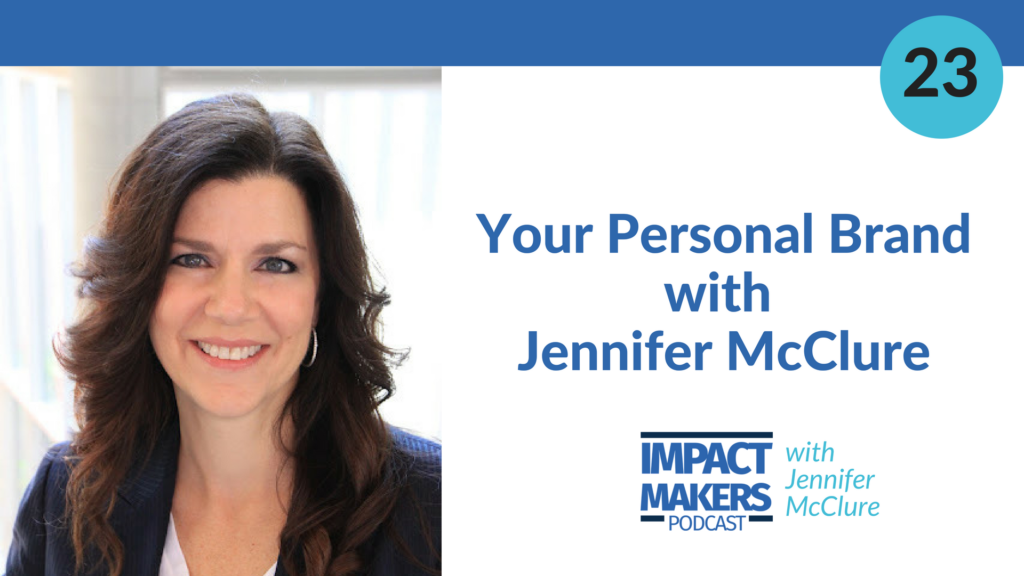
In his Fast Company article, Tom Peters wrote that this is ‘The Age of the Individual,’ and that everyone, from the receptionist to the CEO, must take charge of their own careers by becoming the CEO of The Brand Called You. That was back in 1987, and many people have already caught on, creating a very noisy space. But that means that it’s more important than ever to have your own personal brand as strong as possible.
- How do you determine your own personal brand? You answer the following questions: Who are you, who do you help, and how do you do it? This is the basis for people understanding if they’re interested in you, if they want to do business with you, or hire you. What is your brand telling them right now?
- There are a lot of people who don’t believe in personal branding. They believe that people shouldn’t be treated like ‘tubes of toothpaste,’ shouldn’t be packaged and neat and pretty, because it’s inauthentic. Yes, some people try to brand themselves in a way that isn’t authentic, but you might also consider personal branding as ‘reputation management.’ In fact, you already have a brand – or a reputation – whether you like it or not.
- Let’s dive into what a brand really is, and the definition is pretty simple. When someone says the name of a person or company, brand is the first thing that comes to mind. For example, saying Starbucks evokes the green goddess logo, along with coffee. Maybe for you, it’s ‘comfortable,’ ‘meeting place,’ or even ‘my reason for living.’ That is brand. Think about Apple – it evokes certain feelings for you, one way or another. Those feelings might not all be positive, and that’s important.
- In terms of people, Oprah is a brand and a person. She evokes both positive and negative thoughts. But here’s the important part: she communicates the positive aspects through her work. It’s the message she chooses to share, and it’s what makes her so incredibly successful. Martha Steward is another great example. Jailbird might come to mind, but below that, you have a woman who is a master at home and in the kitchen, and she shares it with the world.
- So what does all this mean for you and your personal brand? People want to be involved with others they like, have positive associations with, or promise something they want. That is true when you’re a job seeker, entrepreneur, author, or already employed and looking to rise within the company. Building authority and influence – and communicating it through your personal brand – helps you succeed with that.
- We mentioned that there’s a lot of noise and the professional and online world is very crowded. Which means that people, more than ever, are looking for others they resonate with. If you haven’t tended your brand, you’re setting yourself up for mediocrity. As Kary Oberbrunner said, “clarity attracts, and confusion repels.” If you don’t know who you are, what you have to offer, and how you can help others, neither will anyone else.
- You don’t need to ignore this lesson because of semantics. You can call it whatever you want: brand, reputation, story. Names aren’t important, but how you communicate with the world is. At the end of the day, people will have impressions about you, just like they do with Starbucks, Apple, and Oprah Winfrey. Would you rather have some degree of control over what those impressions are?
Want a little help creating your personal brand?
Jennifer has a free resource for you. The Personal Brand Workbook will help you figure out what your personal brand is today and what you want to be known for in the future, as well as how you want to impact the world. Download it today!
The Brand Called You – Fast Company
Impact Makers Episode 7 – How I Became A Speaker And Entrepreneur
Society for Human Resource Management
Lean In: Women, Work, and the Will to Lead
Option B: Facing Adversity, Building Resilience, and Finding Joy
Originals: How Non-Conformists Move the World
Give and Take: Why Helping Others Drives Our Success
WorkLife with Adam Grant: A TED original podcast